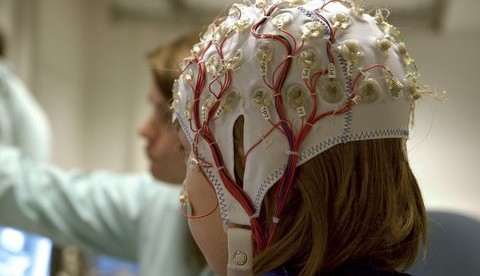An EEG chip for home monitoring

Researchers at Eindhoven University of Technology (Netherlands) are working on an EEG chip that can constantly record brain activity outside the hospital environment for patients suffering from epilepsy or Parkinson's disease. Continuous EEG monitoring will enable quick recognition of acute symptoms, such as an epileptic attack, and fast response by care providers.
Researchers at Eindhoven University of Technology (Netherlands) are working on an EEG chip that can constantly record brain activity outside the hospital environment for patients suffering from epilepsy or Parkinson's disease. Continuous EEG monitoring will enable quick recognition of acute symptoms, such as an epileptic attack, and fast response by care providers.
Presently patients with epilepsy or Parkinson’s disease frequently have to go to the hospital or a specialist clinic for EEG checkups. To find patterns in the EEG signals that indicate an epileptic attack or other symptoms, trained personnel often have to spend a lot of time examining the EEG data. That is very costly, and it requires a professional environment and patient travel to a suitable location.
The objective of the BrainWave project at Eindhoven University of Technology (in Dutch; translation pending) is to develop a portable system for continuous EEG monitoring of epilepsy and Parkinson patients at home. The system is based on a chip that uses four times less power than current EEG instruments. Thanks to continuous monitoring, this handy EEG system can detect the start of an epileptic attack or “freezing” with Parkinson patients and generate an alert.
Presently patients with epilepsy or Parkinson’s disease frequently have to go to the hospital or a specialist clinic for EEG checkups. To find patterns in the EEG signals that indicate an epileptic attack or other symptoms, trained personnel often have to spend a lot of time examining the EEG data. That is very costly, and it requires a professional environment and patient travel to a suitable location.
The objective of the BrainWave project at Eindhoven University of Technology (in Dutch; translation pending) is to develop a portable system for continuous EEG monitoring of epilepsy and Parkinson patients at home. The system is based on a chip that uses four times less power than current EEG instruments. Thanks to continuous monitoring, this handy EEG system can detect the start of an epileptic attack or “freezing” with Parkinson patients and generate an alert.
